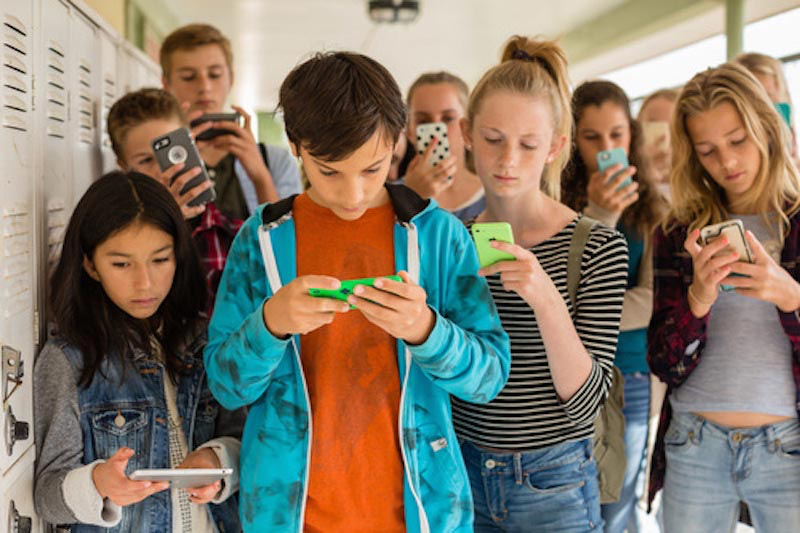 In addition to writing & drawing comics and working as an illustrator, I also use my expertise as a veteran webcartoonist and experiences in advertising to teach a new program designed to introduce middle schoolers to basic ethics, critical thinking, and media literacy called Cyber Civics at a the Waldorf School at Moraine Farm here on Boston’s North Shore.
In addition to writing & drawing comics and working as an illustrator, I also use my expertise as a veteran webcartoonist and experiences in advertising to teach a new program designed to introduce middle schoolers to basic ethics, critical thinking, and media literacy called Cyber Civics at a the Waldorf School at Moraine Farm here on Boston’s North Shore.
This month, I’m running Cyber Civics: A Crash Course in Digital Citizenship, a one-week intensive version of the course. We’ll be tackling all the messy online issues everyone is talking about right now—cyberbullying, privacy, fake news, social media manipulation, sexting and digital addiction—using fun, creative activities, art projects and discussions about the real things kids are seeing at school, on the internet, and in their homes.
Each day has a different theme:
• Day One is all about online identity and how we express ourselves online. We’ll talk about we use avatars and selfies to represent ourselves, and how those representations don’t always line up with who we are. We’ll play an avatar creation game, and create self-portraits. We’ll also talk about the digital trail we leave with every post and examine how others use those trails to learn about us with a “digital background” activity as we figure out what is okay to share and what is not together.
• Day Two digs into ethics and what it means to be a good citizen. The kids will imagine creating their own apps/online communities and explore what it would be like to be a CEO in charge of their own social media site in a “Shark Tank”. There they’ll figure out what the community rules will be and how they’ll protect the people in their community. We’ll also play a game where the students judge different scenarios and determine for themselves if an event was helpful or harmful, intentional or unintentional. My students this past year loved this game because it gave them a chance to discuss some of the things they were already starting to run into online. It also deals with the behavior with adults online, not just students. The day caps off with a discussion of cyberbullying and online drama and drawing comics about how to protect yourself from both.
• Day Three goes into striking a balance with our devices and using them safely. The kids will be challenged to go without using our phones for the duration of the class. The first half of the day examines how we spend our time during the day, both on screens and off. We’ll look at how not all “screen time” is created equal, because using devices for creativity like making art, music, programming, or even starting a business is far different from simply watching YouTube all day. The second half will deal with the basics of online safety—protecting your identity and information, creating good passwords, and figuring out how to deal with people you don’t know (yet) that you meet online.
• Day Four is all about fake news! We start out with how to find good information on the internet, with the basics of how sites like Google and Wikipedia work. We’ll also create a “human internet” game before talking about “C.R.A.P. Detection”, a method that uses Currency (how recent?), Reliability (can I trust it?), Authority (who wrote it?), and Purpose (are they trying to scare me or sell me something?) to evaluate information that we find online. We’ll look at misleading websites and try to evaluate news articles to figure out if they’re fake or real. We’ll also talk about urban legends and how rumors get spread (online and off.) My students during the school year LOVED this unit.
• Day Five we explore media by creating a parody ad for our “Shark Tank” app/site. First we’ll discuss how advertising works and how it uses stereotypes to sell to us and look at how advertisers use our data to track and target us online and manipulate images (both photos and video) to persuade us. Then we’ll design an ad, do a photoshoot, and use Photoshop to create a final piece to be printed up and shared online.
Personally, I like to think of Cyber Civics as the “Defense Against the Dark Arts” class for the internet. It’s about giving students a chance to think through some of the stickier parts of the online world ahead of time so if and when they encounter something nasty, they will already have a set of tools to work with it. Most of the class involves group activities, projects and discussion with some device usage for certain segments. We’ll also take daily walks outside. Enroll your child today and help give them a fighting chance against the real trolls of the world.
Cyber Civics: A Crash Course in Digital Citizenship runs from August 20-24 from 9:00 am – 1:00 pm and is $300 for the week. The program is for rising 6th Graders through rising 9th Graders. To register or for more information, email me at dtiede@waldorfmoraine.org.
